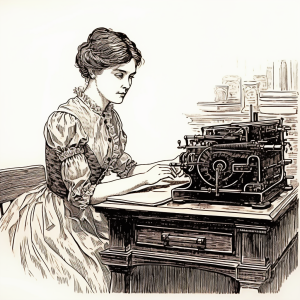CHAPTER IV.
ROUGH PLACES “SMOOTHED OVER.”
When I had spent two days in Mrs. Allison’s service, I began to wonder what the “rough places” would have been like had she not attempted to smooth them over. She certainly could not have accused me of being a slow worker, and I did not “dilly-dally” over my duties, yet on Friday and Saturday I found it impossible to make time for “turning out” the rooms, however much I hurried. I no sooner finished tidying up the bedrooms than the washbowls were again filled to overflowing with soapy water and needed further attention. When I had brushed one dress and hung it in the wardrobe, another flannel gown or coat would be hung out on the banisters. “Such little things! “someone may say. Yes, that is true. A dress may be brushed in five minutes, and a washbasin emptied and wiped out in less time, but these small things call a servant away from her more important work and put her behind for the whole day. On Saturday morning, when I was washing out the dusters in the housemaid’s cupboard, Mrs. Allison presented me with a pair of her husband’s old kid-gloves, saying they would be “nice to wear when brushing the grates.” I uttered a silent prayer that the cold days might not come during my stay, and put them away for the use of my successor. The carrying of coals, building of fires, and emptying ashes are doubtless the hardest part of the work which falls to the women servants in a house where no man is kept, especially in families where every member insists on being comfortable and having fires in the bedrooms. However, Annie informed me that at Mrs. Allison’s the bedrooms were not heated in the winter. Still, with each sleeping-room there was connected a sitting-room, where fires were kept, besides two grates in the drawing-rooms; all of which work fell to the lot of the housemaid.
I soon became accustomed to my work, and was really surprised at the readiness with which I put into practice all I learned from my little book on “Servants’ Duties,” and, although I knew my stay was only a temporary one, I interested myself to discover the easiest and quickest ways for doing the work. After sweeping the stairs the first morning, I found that the small banister brush used for that purpose in most London houses was not a convenient or suitable implement, as it was impossible to get into the corners with it, so it was necessary to use two brushes in the operation. I felt sure that a whisk broom would better meet my requirements, and requested Mrs. Allison to get me one; but she was not inclined to give any help in the way of labour-saving appliances, so I used my own little broom which I had taken with me for brushing my coat. After that the corners were beautifully clean. I would recommend this sort of brush to all housekeepers, not only because of its easy application to the corners, but for the reason that there is no awkward, heavy piece of wood about it, making that disagreeable knockety-knock every time a step is brushed, thus saving wear and tear on the nerves of the housemaid and allowing the members of the family to continue their morning sleep undisturbed by the racket. In the same way, for sweeping both bare floors and carpets, the long-handled straight broom, known as the ” American broom,” seems to me to be ever so much more convenient and easy to manipulate than the English brush broom, which} like the banister broom, will not go into the corners.
All the stairs of the house were covered with felt, the hardest floor-covering in the world to keep clean. Besides the daily sweeping, I was obliged to rub them frequently with a damp cloth in order to remove the accumulated dust and lint. The halls and passages were of stone, with rugs scattered about, which proved to be perfect traps for dust and dirt, and showed conclusively that properly carpeted halls were, in the long run, a great saving of labour. There were gas-pipes in every room, needing only the addition of fixtures to make them ready for use, and thus dispense with the numerous candlesticks that were to be refilled every day. In the halls, on the stairs, and in every room of the house, from the kitchen to the fifth floor, candle-grease was plentifully sprinkled, and my brown paper and hot flat-iron were in constant demand.
It seemed to me that, by expending a little thought and money, a vast amount of unnecessary time might be saved as regarded the continual tidying up of bedrooms, &c. For instance, why should beds first be made up with the blankets and coverlets over the pillows, and then partly remade in the evening when the beds are “turned down”? An easier and much neater way would be to turn down the sheets at once and place the pillows on the outside. Thus only one handling is necessary.
If mistresses would devote more thought to this saving of labour, they would find they were at the same time lessening their household expenses by preventing an unnecessary outlay in servants’ wages, for where work is made light, and quick methods employed, fewer servants are required.
On Saturday a charwoman came in to help make things ready for the new cook. She was a type of the charing sisterhood—big, red-faced, and noisy, with a tendency to order about the servants of the house. She scrubbed and scoured up everything in the basement, yet always stopped just short of finishing what she began. Every stewpan and pot received a rub and a dig with a knife, and was put back on the shelf with some of last year’s grease or soot on it. To make things clean on the outside as well as on the inside seemed never to enter her head. The immense spit used for roasting was brought out, and by its looks I judged that the old cook had never troubled herself to wash it during the last six months. It was subjected to the process of scraping and pounding, which was enough to render it utterly useless ever after. It, too, was put back in the scullery, clean in spots.
That scullery! What a revelation it was to me, and how I resolved that when I got out I would use my influence to abolish sculleries for ever ! I know that the majority of cooks insist upon having what they call a “place for doing the dirty work,” but why should there be this dirty work, if things are done properly each day ? To wash dishes and pots and kettles only hot water, plenty of soap and soda, and a dishcloth are necessary, and, if properly attended to after each meal, there is no reason why they should be put on the shelf with black soot sticking to them. I noticed that the charwoman and Annie seemed to have but one idea in their dishwashing—that of getting things put out of sight, no matter in what condition. When Annie brought the trays down from the dining-room, glasses, silver, knives, cups, meat-platters, and vegetable dishes were heaped together on the table in a miscellaneous mass, and, with the merest attempt at scraping and no effort to sort them, they were thrown into the water which was immediately covered with a scum of grease and tea or coffee grounds. I took advantage of an opportunity to put my scientific method of dishwashing into practice, but failed to make any impression on Annie’s mind, for she returned to her old way at supper-time. I first put all the glasses together, then emptied everything from cups and saucers, and placed them in a neat pile. Then the spoons, knives and forks, plates, meat and vegetable dishes, were cleansed of leavings and grease, and put in other piles near the dishpan, while all pots and kettles were cleaned out as thoroughly as possible with a knife, and hot water poured into them to soak off the remainder while I washed the best dishes.
These preliminary arrangements did not take more than five minutes, and then I was ready to proceed with dish-washing without the annoyance of greasy dish-water. The silver and glasses were washed and dried before I went on with the cups and plates, for I knew that, unless they were polished while they were hot, they would look smeared and dirty. I am aware that many servants insist on putting dishes away to dry on a rack, without applying a towel until they are ready to lay the table; but I have never seen a clean and well-polished dish that was so handled. If dish-racks were abolished along with the sculleries, mistresses would find less reason to complain of the tables being laid with smeared and nicked dishes. Nothing can be more aggravating and unsightly than an expensive set of china with cracks and bits chipped off the edges; and what little experience I had in the kitchen went to show me that ail this could be prevented if dishes were washed, dried, and put away immediately after each meal.
Annie and I ate dinner on Saturday with the charwoman, who munched away at her bread and meat with her sleeves rolled up, exposing very fat, red arms. In the afternoon I was ordered to assist her in moving an iron bedstead from one room to another. She insisted that the bed could be pushed through the door without being taken apart, while I was of a different opinion. She did not look a pleasant person to cross, so I followed her instructions. The spirit was willing, but the flesh was weak, and, try as I would, I could not manage to lift the thing from the floor.
“Come on there, Liz! can’t ye heft a bit?” she exclaimed impatiently. For the moment I forgot my cap and apron, and remembered only my outraged dignity and aching arms. Fortunately, ere I delivered myself of a scathing rebuke for her familiarity, a streamer flapped in my face, a timely reminder of my altered condition and circumstances.
Thus the Allison family were spared the interesting scene of a combat between the housemaid and the charwoman.
The bed finally had to be dismantled and taken apart, and the charwoman seemed to regard me as the cause of all the trouble. At tea-time she had somewhat relented, and offered to share her pitcher of bitter ale with me. (Mrs. Allison, I may mention, showed the good sense not to supply the servants with beer, and, if they drank it, it was at their own expense.)
“Better take it, young woman,” said she, as I refused the glass she pushed towards me. “Ye’ll need a strengthener if yer housemaid in this place. I’ve chared here five years, and I know the housemaid they had before Annie came worked herself into the ‘ospital in less than a year’s time. She’s done for now, is Annie. Got housemaid’s knee with all the scrubbing.”
I decided to investigate into the cause and cure of this ailment, and took out a small note-book I carried in my apron pocket, and wrote down a few shorthand notes.
“What’s them queer marks?” asked Annie, edging around to my side of the table and looking over my shoulder.
I explained that I was trying to learn stenography with a view to bettering my position in life later on.
Annie smiled her approval of the project, and thought I should be able to earn as much as thirty shillings a week if I got a place.
The area gate bell rang just then, and Annie begged me to answer it, because I had finished tea and she had not. I started out, and got half-way up the stairs, when, looking up, I saw our own butcher’s boy holding out a joint for me to take into the kitchen. “Hello, another new ‘un!” he observed, and then, fearing he would recognise and betray me, I bolted backwards and into the kitchen, explaining that I had hurt my foot, and asked Annie to get the meat. From that time I lived in terror of being; asked to go on hasty errands, when I would not have an opportunity to remove my cap and apron. It was not that I was ashamed of the badge, but simply that I did not care to be recognised in the guise by any friends or neighbours I might meet. I was always careful to wear my coat and hat when I posted the letters in the evening, much to the disgust of Annie, who insisted that I wasted too much time in “primping.”
Saturday night the missing members of the family came home with their luggage and their maid. The boxes were heaped in the front hall and partly unpacked there. Mrs. Allison said that Annie and I were to carry them up-stairs the next morning, and I lay awake half the night wondering how I should be able to manage it without breaking any bones. Sunday morning we were allowed a half-hour’s extra sleep; but, to my astonishment, Annie informed me that the same round of work must be done as on weekdays. The stairs and passages, bedrooms, sitting rooms, and drawing-rooms were to be swept and dusted, and I was busy until twelve o’clock as on former days. Then we had the various boxes to carry to the fourth floor, During the process Annie assured me that the weight seemed to be all at her end of the boxes, and I felt she had every reason to complain, though I tugged away with might and main. Women servants are not fitted for doing this sort of work, and in the case of families where no manservant is employed outside help should be brought in.
The gentleman of the house stood by, and saw us carrying the boxes and heard me remark that the cabman should have attended to them the previous night, but he seemed to be unimpressionable. Annie informed me that the evening before she had been obliged to assist the cabman in getting them from the top of the four-wheeler.
At two o’clock, as a meal for seven persons had to be cooked, Mrs. Allison asked me to wait at table while Annie stayed in the kitchen. I dressed in my very best for that auspicious occasion, for it was my debut as a waitress. Annie gave me instructions beforehand, so that everything went off very creditably. Only once did I pass things to the right of the individual instead of to the left. No dishes were broken and nothing spilled over. I stood back in the corner of the dining-room awaiting orders from the head of the table, and many times had difficulty in repressing a smile as I listened to the table-talk. The first thought that occurred to me as I carried the heavy iron trays up the stairs was, “Why do not housewives spend a few pounds and have lifts put in, connecting dining-room and kitchen, thus saving all this running up and down stairs?” The trays were immense iron things that were in themselves very heavy without the addition of china and eatables. There are light tin trays to be had that answer every purpose, and I almost felt like suggesting the fact to Mrs. Allison after dinner, but I remembered her refusal of the whisk broom and desisted. It was half-past four when the dishes were cleared away. I began to feel anxious about my Sunday afternoon off, for I had received a letter, forwarded from the Camberwell address, telling me to call on Mrs. Brownlow, in Kensington, at six o’clock Sunday, as she thought she could employ me as parlourmaid. At five I asked permission to go out, which was granted. I found the Kensington lady a most charming person, and made arrangements to enter her service as parlourmaid the following Thursday evening, though how I should get rid of my present place I had not then decided. I was determined to try at least two situations before giving my experiences to the public, and I began to feel that my story of Mrs. Allison would not be a pleasant one to relate.
I returned at seven, and found Annie busily engaged in answering the door. It was Mrs. Allison’s day at home. I helped to prepare the tea and cakes, later we served supper to the family, and at nine had our own bread and cheese. So this was a Sunday in service. I had two hours’ rest; Annie had none! I remembered a command I had been taught in my youth which had to do with the keeping of the Sabbath, and said something about manservants and maidservants. I am not a Sabbatarian, but I contend that in the name of reason, and on good general business principles, every man and woman should have one day’s rest during the week, be it Sunday or some other day. The round of sweeping should be omitted on Sunday, only a light dinner prepared, and a part of the servants be allowed to spend most of the day in their rooms, in church, or in the park, according to their inclinations, and the servants who must remain on duty during Sunday should be given a resting day during the week. I know it is asserted that most mistresses give their maids a whole or half-holiday each week, but my investigations have led me to believe that this is often neglected, and, whether or not it is so, the Sunday duties should be made as light as possible.
Monday evening the new cook made her appearance, and our board wages ceased. I did not do any marketing, thinking that henceforth we should be provided with suitable meals. For breakfast, Tuesday, bread and butter and coffee were placed on the table.
“Is there no meat or potatoes?” I questioned Annie.
“No, the missus never allows us anything in the morning but bread and coffee.”
I was already tired with my morning’s work, and, having been told I must “turn out” two rooms that day, I knew that, without a proper breakfast, I should not be able to get through. I would speak to Mrs. Allison about it.
“Better not,” said Annie; “the last cook fried some fish for breakfast one morning, and she got notice.”
“Annie,” I said, “I’m afraid this place is going to be too hard for me. I don’t think I’ll stop after my week is up.”
“But you can’t leave without giving notice. If you do, she’ll make you pay her a whole month’s wages; and, if she makes you go without giving notice, she must pay you a month’s wages,” explained my co-worker.
“But suppose I do something she doesn’t like and she discharges me?”
“Why, then, you’d have to go; but she wouldn’t give you a character.”
I went to Mrs. Allison’s room and knocked at the door.
“Mrs. Allison, do you not allow the servants anything for breakfast but bread and coffee ? I thought there must be some mistake,” I said, as she opened the door.
“No, it is not a mistake,” was her reply.
“But I must have a good breakfast or I simply cannot do the work, so I will go out and buy some meat myself.”
“Very well, do so,” she answered as she shut the door. An hour later, I was making her bed, when she entered the room.
“Lizzie, I have been thinking it over, and I have decided that you and I won’t pull,” was her announcement.
“No, I don’t think we will, Ma’am,” I replied.
“Then, if you will wait until I get suited,” she continued, “you may go.”
I told her I was sorry I could not accommodate her, but that I preferred to leave Thursday, and she went off in high dudgeon, saying that any common servant would show her mistress the courtesy to remain until she was suited.
Thus it came to pass that I was discharged from my first place without a character because I, like Oliver Twist, had the audacity to “ask for more.” But I had three more days to work for Mrs. Allison, and I looked forward to Thursday with fear and trembling.



